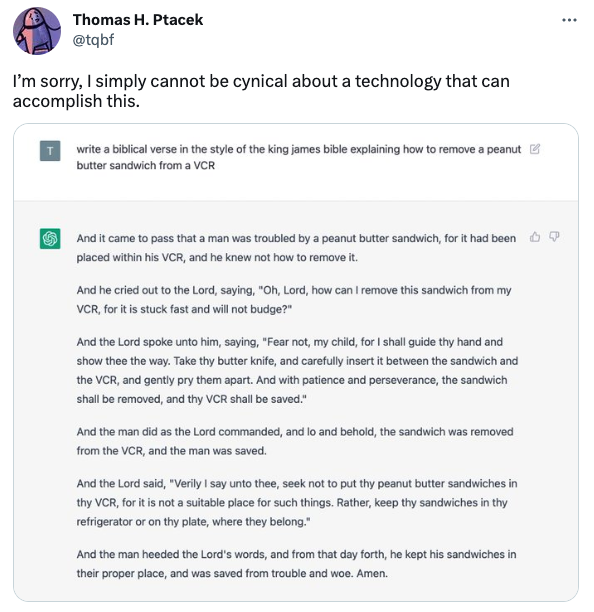These days, it seems like everyone’s talking about — and talking to — ChatGPT. But does ChatGPT have anything useful to say? Patrick Cullen, Copywriter at LEP Digital asked ChatGPT for the answer.
Does ChatGPT have anything useful to say?
Examples of ChatGPT-generated content appear online faster than you can hit ‘regenerate response’. Among the examples, you’ll find content that supports whichever side of the tool/toy fence you’re on.
One of the earliest and most attention-grabbing bits of content was first shared online in November 2022 by Thomas Ptacek. Ptacek, a software developer, had asked ChatGPT for instructions on the improbable problem of ‘removing a peanut-butter sandwich from a VCR, written in the style of the King James Bible.’
The response he got was epic — in tone and on Twitter. ChatGPT had advised Ptacek to ‘Take thy butter knife, and carefully insert it between the sandwich, and gently pry them apart.’
Alongside screenshots of the exchange, Ptacek wrote, ‘I simply cannot be cynical about a technology that can accomplish this.’ And of the tens of thousands of people who saw the exchange, many thought the same thing (and, surprisingly, it wasn’t ‘What is Ptacek doing with a VCR in 2022?’).
People were amazed at the supposed value of ChatGPT’s response. But had ChatGPT said anything useful? Maybe it did in Ptacek’s case but when other users tried the same prompt they received less useful responses. One was advised to leave the sandwich, ‘….for it is not a task for man.’ Another was reminded by ChatGPT of its limitations: “As a large language model trained by OpenAI, I do not have the ability to create original content or poetry.”
We asked ChatGPT to tell us about its own pros and cons
ChatGPT’s inconsistency and its supposed awareness of its limitations prompted us to ask ChatGPT to ‘write a 500-word informative article on the pros and cons of using ChatGPT to write anything.’
Here’s what it had to say:
ChatGPT, a language model developed by OpenAI, has gained significant attention for its ability to generate human-like text. While it has shown impressive performance in various language tasks, including language translation, summarization, and question answering, the use of ChatGPT in generating written content raises concerns about its reliability, accuracy, and potential biases. In this article, we will explore the pros and cons of using ChatGPT to write anything.
Pros:
- Saves time and effort: ChatGPT can quickly generate high-quality content without the need for extensive research or writing. This can be particularly useful for individuals or businesses that need to produce large volumes of content on a regular basis.
- Improves productivity: ChatGPT can free up time for writers to focus on other tasks, such as editing or content strategy. This can improve overall productivity and efficiency in content creation.
- Expands creativity: ChatGPT’s ability to generate a variety of language styles, including poetry and fiction, can inspire writers to explore new ideas and approaches to writing.
- Language translation: ChatGPT can help overcome language barriers and facilitate communication between individuals or businesses that speak different languages.
- Scalability: ChatGPT can produce content at scale, making it ideal for businesses and organizations that need to generate large volumes of content on a regular basis.
Cons:
- Lack of control: ChatGPT’s output is not always predictable, and the generated content may not always align with the writer’s intentions or objectives.
- Quality control: ChatGPT’s output may contain errors or inaccuracies that need to be corrected, which can be time-consuming and require additional effort.
- Limited domain knowledge: ChatGPT’s training data is sourced from a diverse range of topics, but it may not have the depth of domain-specific knowledge required for certain types of writing, such as technical or scientific writing.
- Potential for bias: ChatGPT’s training data may contain biases that can influence the generated content, including gender, race, and cultural biases.
- Lack of originality: ChatGPT’s output is based on existing text data, which means that the generated content may lack originality and creativity.
Conclusion:
ChatGPT offers many advantages in generating written content, including time savings, productivity improvements, and language translation. However, it also has limitations, including lack of control, quality control issues, limited domain knowledge, potential biases, and lack of originality. While ChatGPT can be a useful tool for writers and businesses, it is important to understand its strengths and weaknesses and to use it judiciously to ensure that the generated content is accurate, reliable, and aligned with the intended objectives. Ultimately, the decision to use ChatGPT or other AI-based writing tools should be based on a careful consideration of the specific use case, available resources, and desired outcomes.
What do we think about what ChatGPT has to say?
Our conclusion is pretty much the same as ChatGPT’s. While it does make it possible to produce large volumes of content quickly, that content may require substantial revision. This means that the time apparently saved in writing is actually lost in rewriting. And, by the time you’ve finished rewriting, what’s the chance you’ll even remember where you left your peanut butter sandwich?









